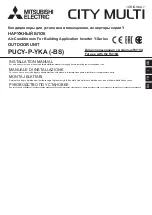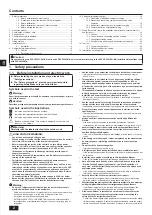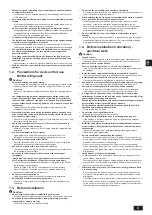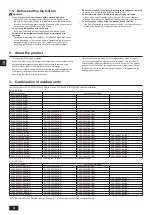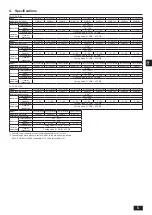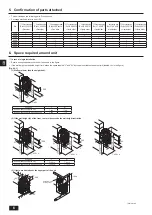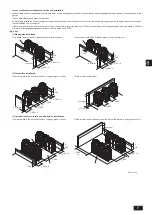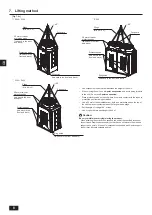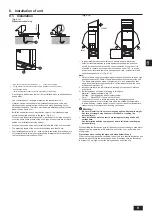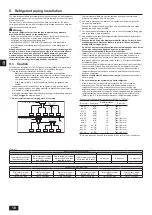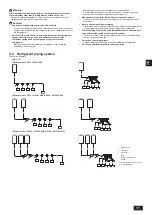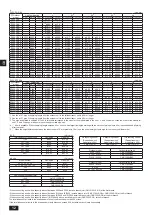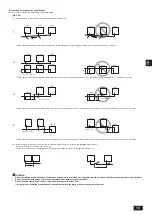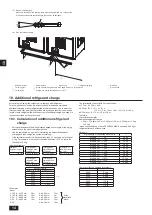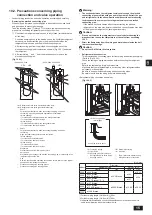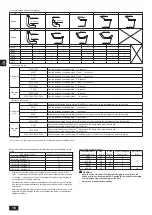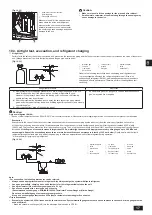
3
GB
• Do not use the air conditioner in special environments.
- Oil, steam, sulfuric smoke, etc. can significantly reduce the performance of
the air conditioner or damage its parts.
• When installing the unit in a hospital, communication station, or similar
place, provide sufficient protection against noise.
- Inverter equipment, private power generator, high-frequency medical
equipment, or radio communication equipment may cause the air
conditioner to operate erroneously, or fail to operate. On the other hand,
the air conditioner may affect such equipment by creating noise that
disturbs medical treatment or image broadcasting.
• Do not install the unit on or over things that are subject to water
damage.
- When the room humidity exceeds 80% or when the drain pipe is clogged,
condensation may drip from the indoor unit. Perform collective drainage
work together with the outdoor unit, as required.
1.4. Before installation (relocation) -
electrical work
Caution:
• Ground the unit.
- Do not connect the ground wire to gas or water pipes, lightning rods, or
telephone ground lines. Improper grounding may result in electric shock.
• Never connect in reverse phases.
Never connect the Power Line L1, L2, and L3 to Terminal N.
- If the unit is miss wired, when power is supplied, some electrical parts will
be damaged.
• Install the power cable so that tension is not applied to the cable.
- Tension may cause the cable to break and generate heat and cause a fire.
• Install a leak circuit breaker for an inverter, as required.
- If a leak circuit breaker is not installed, electric shock may result.
• Use power line cables of sufficient current carrying capacity and rating.
- Cables that are too small may leak, generate heat, and cause a fire.
• Use only a circuit breaker and fuse of the specified capacity.
- A fuse or circuit breaker of a larger capacity, or the use of a substitute
simple steel or copper wire may result in a general unit failure or fire.
• If a large electric current flows due to malfunction or faulty wiring,
earth-leakage breakers on the unit side and on the upstream side of the
power supply system may both operate.
Depending on the importance of the system, separate the power supply
system or take protective coordination of breakers.
• Do not touch the electrical parts with bare hands while the unit is in
operation or immediately after operation.
- Doing so may result in burns.
• Do not wash the air conditioner units.
- Washing them may cause an electric shock.
• Be careful that the installation base is not damaged by long use.
- If the damage is left uncorrected, the unit may fall and cause personal
injury or property damage.
• Install the drain piping according to this Installation Manual to ensure
proper drainage. Wrap thermal insulation around the pipes to prevent
condensation.
- Improper drain piping may cause water leakage causing damage to
furniture and other possessions.
• Be very careful about transporting the product.
- One person should not carry the product. Its weight is in excess of 20 kg.
- Some products use PP bands for packaging. Do not use any PP bands as
a means of transportation. It is dangerous.
- Do not touch the heat exchanger fins. Doing so may cut your fingers.
- When transporting the outdoor unit, support it at the specified positions on
the unit base. Also support the outdoor unit at four points so that it cannot
slip sideways.
• Safely dispose of the packing materials.
- Packing materials, such as nails and other metal or wooden parts, may
cause stabs or other injuries.
- Tear apart and throw away plastic packaging bags so that children will not
play with them. If children play with a plastic bag which has not been torn
apart, they face the risk of suffocation.
• When the power is turned on, the compressor is energized even while
it is not operating.
- Before turning on the power, disconnect all power supply wires from the
compressor terminal block, and measure the insulation resistance of the
compressor.
- Check the compressor for a ground fault. If the insulation resistance is 1.0
MΩ or below, connect all power supply wires to the compressor and turn
on the power to the outdoor unit. (The liquid refrigerant in the compressor
will evaporate by energizing the compressor.)
• When moving and reinstalling the air conditioner, consult the dealer or
an authorized technician.
- If the air conditioner is installed improperly, water leakage, electric shock,
or fire may result.
• After completing installation work, make sure that refrigerant gas is not
leaking.
- If the refrigerant gas leaks and is exposed to a fan heater, stove, oven, or
other heat source, it may generate noxious gases.
• Do not reconstruct or change the settings of the protection devices.
- If the pressure switch, thermal switch, or other protection device is shorted
or operated forcibly, or parts other than those specified by Mitsubishi
Electric are used, fire or explosion may result.
• To dispose of this product, consult your dealer.
• The installer and system specialist shall secure safety against leakage
according to local regulation or standards.
- Choose the appropriate wire size and the switch capacities for the main
power supply described in this manual if local regulations are not available.
• Pay special attention to the place of installation, such as a basement,
etc. where refrigeration gas can accumulate, since refrigerant is
heavier than the air.
• For outdoor units that allow outside air intake to the indoor unit, the
installation site must be carefully chosen to ensure only clean air can
enter the room.
- Direct exposure to outdoor air may have harmful effects on people or food.
• Children should be supervised to ensure that they do not play with the
appliance.
1.2. Precautions for devices that use
R410A refrigerant
Caution:
• Do not use existing refrigerant piping.
- The old refrigerant and refrigerant oil in the existing piping contains a large
amount of chlorine which may cause the refrigerant oil of the new unit to
deteriorate.
- R410A is a high-pressure refrigerant and can cause the existing piping to
burst.
• Use refrigerant piping made of phosphorus deoxidized copper and
copper alloy seamless pipes and tubes. In addition, be sure that the
inner and outer surfaces of the pipes are clean and free of hazardous
sulphur, oxides, dust/dirt, shaving particles, oils, moisture, or any other
contaminant.
- Contaminants on the inside of the refrigerant piping may cause the
refrigerant oil to deteriorate.
• Store the piping to be used during installation indoors and keep both
ends of the piping sealed until just before brazing. (Store elbows and
other joints in a plastic bag.)
- If dust, dirt, or water enters the refrigerant cycle, deterioration of the oil and
compressor failure may result.
• Apply only a small amount of ester oil, ether oil, or alkyl benzene to
flare connections (for indoor unit).
- Infiltration of a large amount of mineral oil may cause the refrigerant oil to
deteriorate.
• Use liquid refrigerant to fill the system.
- If gas refrigerant is used to fill the system, the composition of the
refrigerant in the cylinder will change and performance may drop.
• Do not use a refrigerant other than R410A.
- If another refrigerant (R22, etc.) is mixed with R410A, the chlorine in the
refrigerant may cause the refrigerant oil to deteriorate.
• Use a vacuum pump with a reverse flow check valve.
- The vacuum pump oil may flow back into the refrigerant cycle and cause
the refrigerant oil to deteriorate.
• Do not use the following tools that are used with conventional
refrigerants.
(Gauge manifold, charge hose, gas leak detector, reverse flow check
valve, refrigerant charge base, refrigerant recovery equipment)
- If the conventional refrigerant and refrigerant oil are mixed in the R410A,
the refrigerant may deteriorate.
- If water is mixed in the R410A, the refrigerant oil may deteriorate.
- Since R410A does not contain any chlorine, gas leak detectors for
conventional refrigerants will not react to it.
• Do not use a charging cylinder.
- Using a charging cylinder may cause the refrigerant to deteriorate.
• Be especially careful when managing the tools.
- If dust, dirt, or water gets into the refrigerant cycle, the refrigerant may
deteriorate.
1.3. Before installation
Caution:
• Do not install the unit where combustible gas may leak.
- If the gas leaks and accumulates around the unit, an explosion may result.
• Do not use the air conditioner where food, pets, plants, precision
instruments, or artwork are kept.
- The quality of the food, etc. may deteriorate.

